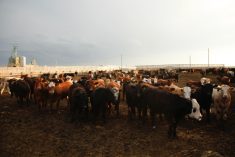Reuters — Grains trader Cargill reported a nearly five per cent rise in quarterly profit on Thursday as global demand for beef and improved oilseed crushing results offset challenges in several business units.
But Cargill also faced various headwinds across the company — particularly in its protein and food ingredients units, both of which have been strategic growth areas.
“Solid” oilseed processing results in canola, soybeans and biodiesel in North America and Europe, and improved performance in its Asia-Pacific trading business helped bolster Cargill’s fiscal first-quarter results, the company said in a statement.
Read Also

Alberta crop conditions improve: report
Varied precipitation and warm temperatures were generally beneficial for crop development across Alberta during the week ended July 8, according to the latest provincial crop report released July 11.
Processors including Cargill have benefited from increasing global demand for soymeal and from soybean prices being near 11-year lows.
The privately-held company said on Thursday net income rose to $1.02 billion in the first quarter ended Aug. 31, from $973 million a year earlier (all figures US$). Operating earnings fell to $883 million from $888 million a year earlier while revenue rose five per cent to $28.7 billion.
But gains in oilseed processing and Asian trading could not completely overcome turbulence in other parts of the company.
Weak North American ethanol prices and devaluations in emerging market currencies dented results for starches, sweeteners and texturizers.
Lower sales and higher input costs weighed on its animal nutrition unit, while a glut of turkey meat in the United States outweighed demand and pressured prices. Its global poultry business was hurt by weak results in Southeast Asia and Central America.
The Wayzata, Minn.-based company last week recalled 132,000 lbs. of beef over possible contamination and is being investigated by U.S. officials after 17 people fell ill and one died.
Higher interest costs and recessionary events in Argentina caused certain Cargill investments to decline in value, the company said.
There is also mounting uncertainty over the U.S.-China trade war’s possible impact on the global grain trade. China said it will switch up its animal feed rations to no longer rely so heavily on U.S. soy.
Cargill, which reported its highest-ever adjusted operating earnings in the most recent fiscal year, has weathered the trade war in recent quarters better than some of its rivals.
Bunge earnings last quarter stumbled to a surprise loss it blamed partly on wrong-sided bets that a prompt trade truce would lift soybean futures.
And Louis Dreyfus announced this week its CEO and finance chief quit in the French company’s latest shake-up.
— P.J. Huffstutter reports on agriculture for Reuters from Chicago; additional reporting by John Benny in Bangalore.














